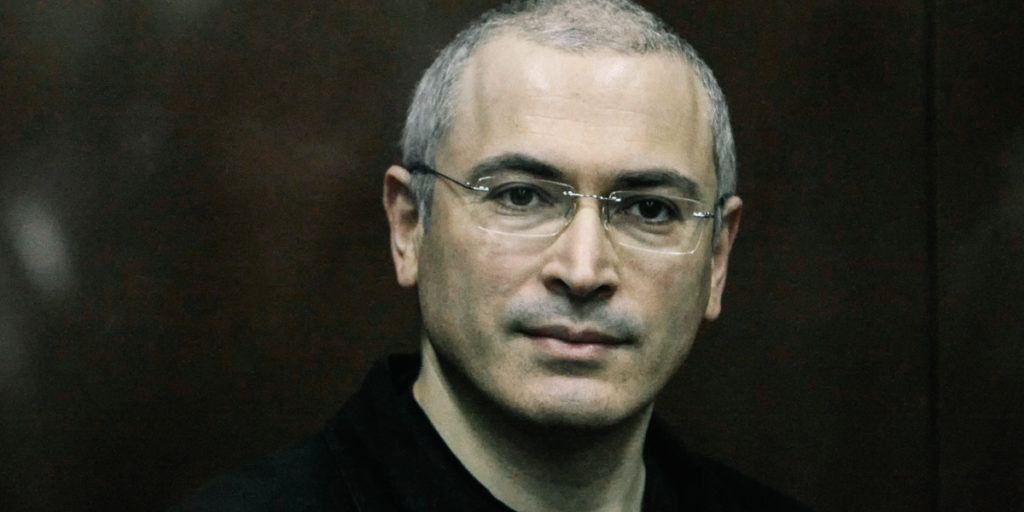Citizen K

Mikhail Khodorkovsky. Image courtesy TIFF.
Alex Gibney’s CITIZEN K explores the political landscape of post-Communist Russia through the lens of the successes and failures of Mikhail Khodorkovsky. A recruit of the Komsomol, Khodorkovsky exploited the privatization voucher and loans for shares programs of the early 1990’s, upon which he amassed a fortune. He used his consolidated wealth from the voucher program to start a bank, Menatep, which in turn acquired shares in the formerly state-owned Yukos when in November of 1992, by Presidential decree, the state began selling off these assets.
Initially a proponent of the capitalism promised by new regimes, Khodorkovsky began to see that for a culture which transitioned abruptly from five hundred years of monarchic autocracy to Communism. In the 1990’s Russia would again transition abruptly to capitalist democracy. But, as Gibney’s documentary argues, without a sense of rule of law, the country fell into a kind of caricature of the American Old West lawlessness.
Thus came the first wave of oligarchs, including Khodorkovsky, Boris Berezovsky, Vladimir Potanin (one of the first such oligarchs to buy shares in voting machine manufacturers), and Alexander Smolensky, among others. The film traces a line from their acquisition of state assets amid the lawlessness of a “free” Russia. Putin, a hardliner from nowhere, seized on the power of media under a familiar promise: He alone could get rid of the parasitic oligarchs. What he didn’t explain was that he’d simply replace them with another group of oligarchs loyal only to him. Sound familiar?
Gibney excavates through mountains of historical interviews, state propaganda, documents and analyses, to draw a line from the first opportunistic wave of oligarchs to the second, which includes Roman Abramovich, Oleg Deripaska, Viktor Vekselberg, and once again Vladimir Potanin—collectively the architects of the 2016 interference in U.S. elections.
Not well understood by Americans is the Russian culture and motivations as to why an elitist class could thrive in spite of massive poverty. American GDP per capita is currently six times that of Russia’s, which swings violently—collapsing 40% in three years. The central thesis of Russian acquiescence lies in three things: A lack of experience with and understanding of the regulatory evolution of capitalism, a desire to be once again seen as a world superpower and not an economic embarrassment, and an acquiescence to systemic corruption—if everybody knows everybody is lying, then how can anyone truly be exploited?
While Gibney’s doc tries to position Khodorkovsky as a reformed oligarch, skepticism remains. Can we really call it empathy if the first victim to awaken a selfish man is himself? Gibney describes Khodorkovsky as a man in it for the long game, but this reminds us of Putin—a man who took years to lay the foundations of the Russian Military Intelligence operation that, by most accounts, appears to be interfering in elections around the world. The roots of this operation go back twenty years to Putin’s awakening to the power of mass media in the proliferation of propaganda and noise to disorient others from the truth.
Khodorkovsky, curiously silent about certain moral ambiguities in his past, wrote a “capitalist manifesto” with his then-partner Leonid Nevzlin extolling the virtues of not the free development and trade of ideas and crafts, but the acquisition of wealth above all else. With his rimless glasses, close-cropped silver hair, and Valley swagger, it’s rather peculiar Gibney never draws even a single comparison to tech entrepreneur Steve Jobs—famous for his ruthlessness, and likewise rebranded into a saint despite confirmations to the contrary.
Gibney assures us that no money from Khodorkovsky funded the production of this picture, but his words and ideas permeated it. Once the richest man in Russia, following the acquisition of his Yukos assets by the state-owned Rosneft, he is now down to his last $200 or $300 million. Some critics of Donald Trump estimate that the serial bankrupter-in-chief had roughly $200 or $300 million in actual net worth when Russia approached him. Carrying massive amounts of debt, he was vulnerable. Fox News branded him to the masses as the man who would “drain the swamp”—clean up the corruption.
Khodorkovsky’s self-positioning as the underdog has won him support from Russians who now see the state as the oppressor. Khodorkovsky wants to help them, with a project called OpenRussia which funds Internet cafes around Moscow and alternative media to disseminate his anti-Putin message whilst in exile. What if OpenRussia is simply his Channel One, or Russia Times, or Fox News?
Fool me once…